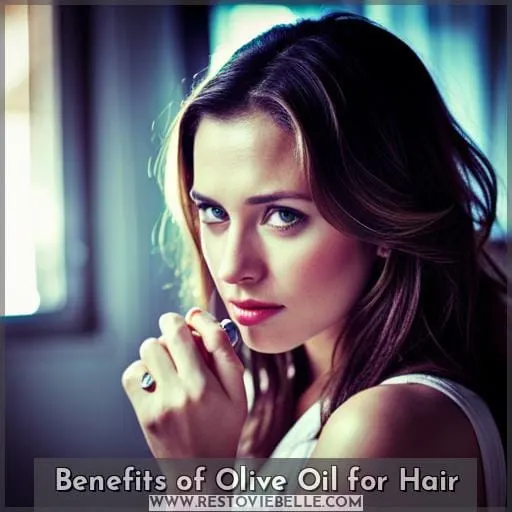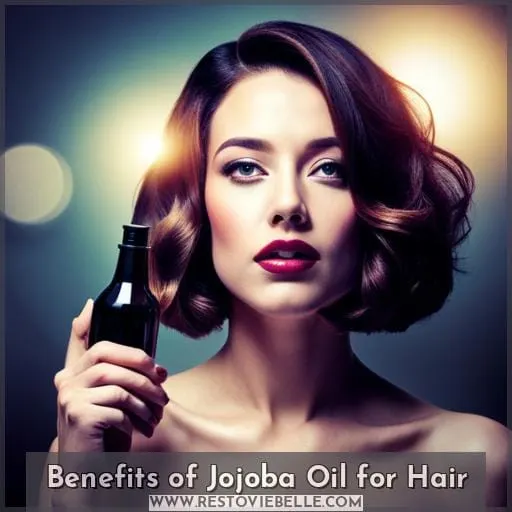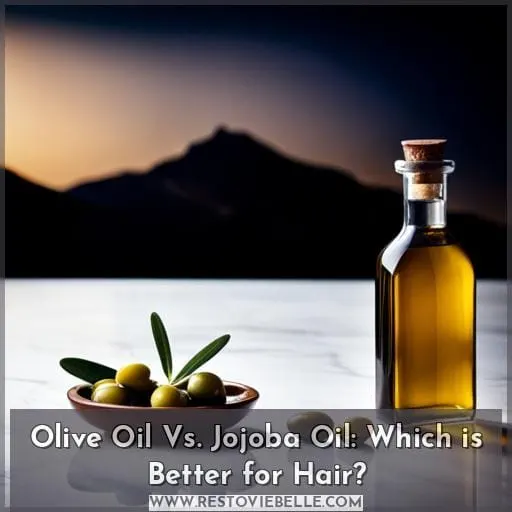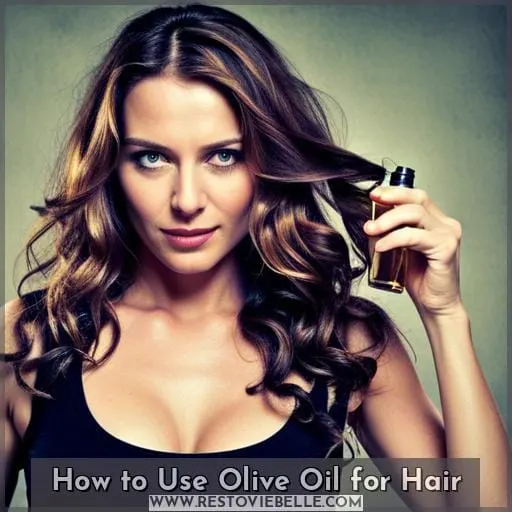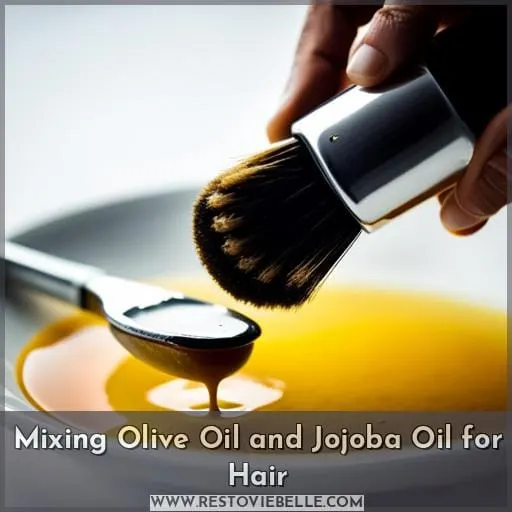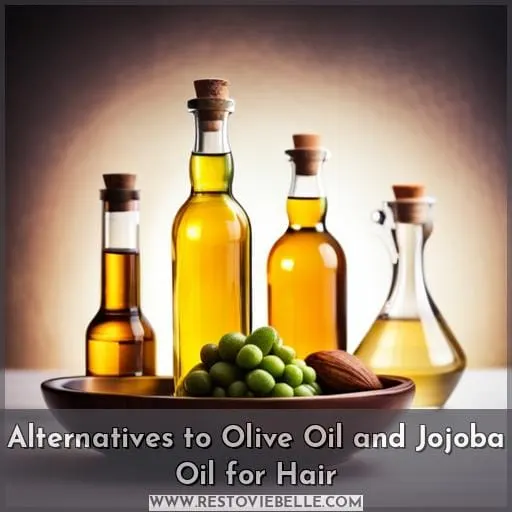This site is supported by our readers. We may earn a commission, at no cost to you, if you purchase through links.
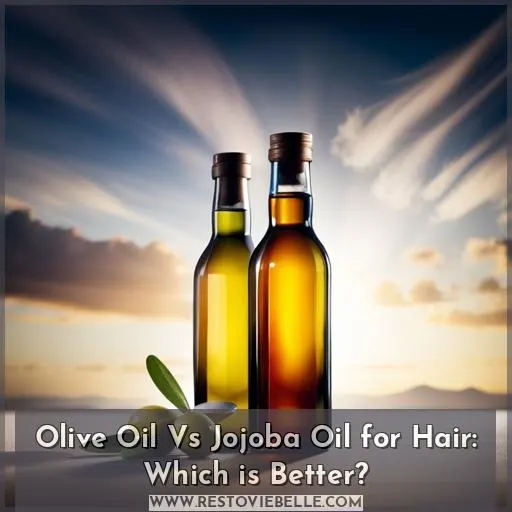
From moisturization to dandruff control, these oils have a range of benefits that can transform the health and appearance of your locks.
Table Of Contents
- Key Takeaways
- Benefits of Olive Oil for Hair
- Benefits of Jojoba Oil for Hair
- Olive Oil Vs. Jojoba Oil: Which is Better for Hair?
- How to Use Olive Oil for Hair
- How to Use Jojoba Oil for Hair
- Mixing Olive Oil and Jojoba Oil for Hair
- Alternatives to Olive Oil and Jojoba Oil for Hair
- Frequently Asked Questions (FAQs)
- Can olive oil and jojoba oil be used together for hair care?
- Are there any side effects or risks associated with using olive oil or jojoba oil on hair?
- Which oil is better for promoting hair growth: olive oil or jojoba oil?
- Can olive oil or jojoba oil be used on all hair types, including oily or greasy hair?
- Are there any specific hair problems or conditions that olive oil or jojoba oil can help with?
- Conclusion
Key Takeaways
- Olive oil is thicker and ideal for dry and dull hair.
- Jojoba oil has a lighter consistency and is great for a dry scalp and dandruff control.
- Both oils can be used together for hair care.
- Other alternatives to consider are coconut oil, castor oil, and argan oil.
Benefits of Olive Oil for Hair
When it comes to taking care of your hair, olive oil offers a wide range of benefits.
First and foremost, it acts as a conditioner and moisturizer for your hair, keeping it soft and hydrated.
Additionally, olive oil helps reduce dandruff and dryness on the scalp while also strengthening the hair shaft to prevent breakage.
Lastly, using olive oil can improve the overall texture and appearance of your hair by giving it a smooth shine.
Hair Conditioning and Moisturization
To achieve optimal hair conditioning and moisturization, olive oil is an excellent choice.
Olive oil has great absorbency, providing weightless hydration to the hair. It enhances shine, smoothness, and manageability while protecting against brittleness and buildup without causing greasiness.
Reduction of Dandruff and Dryness
To reduce dandruff and dryness, olive oil provides effective benefits for your hair.
Its deep conditioning properties moisturize the scalp, preventing flakiness and itchiness.
Olive oil also promotes healthy hair growth and gives it a beautiful shine.
Incorporate it into your routine for nourished, dandruff-free locks.
Prevention of Hair Loss
To prevent hair loss, olive oil offers a range of benefits that can nourish and strengthen your hair.
It promotes healthy hair growth, increases hair thickness, and prevents the effects of DHT hormone on your scalp.
Incorporating olive oil into your regular hair care routine is essential for effective prevention of hair loss.
Strengthening and Protection Against Breakage
To strengthen and protect your hair against breakage, olive oil offers exceptional benefits. It reduces hair loss, improves hair texture, prevents hair damage, promotes hair growth, and nourishes the strands from root to tip.
Improvement of Hair Texture and Appearance
To improve the texture and appearance of your hair, olive oil offers numerous benefits that can transform dry and dull locks into shiny, voluminous tresses. Olive oil provides shine, smoothness, softness, manageability, volume, body, growth, thickness, health and vitality to your hair.
| Benefit | Description |
|---|---|
| Shine | Olive oil gives a natural sheen to the hair, making it look glossy and radiant. |
| Smoothness | The moisturizing properties of olive oil help smoothen out frizz and flyaways for a sleeker look. |
| Softness | Regular use of olive oil can make your hair feel softer to touch by deeply hydrating each strand. |
| Manageability | Olive oil helps to detangle hair and make it easier to style. |
| Volume | Olive oil can help to add volume to fine or thin hair. |
| Body | Olive oil can help to give hair a fuller, more voluminous look. |
| Growth | Olive oil may help to promote hair growth by stimulating the scalp and improving blood circulation. |
| Thickness | Olive oil can help to thicken hair by adding moisture and nutrients. |
| Health | Olive oil can help to improve the overall health of your hair by protecting it from damage and dryness. |
| Vitality | Olive oil can help to give your hair a healthy, vibrant shine. |
Benefits of Jojoba Oil for Hair
When it comes to the benefits of jojoba oil for your hair, you’ll be pleased to discover its range of advantages.
Jojoba oil excels at conditioning and hydrating your hair from root to tip, leaving it soft and nourished.
It also effectively controls dandruff, repairs dry and damaged strands caused by heat styling tools, and promotes healthy hair growth for thicker locks with added volume.
Conditioning and Hydration
To deeply condition and hydrate your hair, jojoba oil is an excellent choice. Its moisturizing properties prevent damage, reduce frizz, and promote growth.
Unlike other oils like avocado or castor oil, jojoba oil closely mimics the natural sebum of the scalp for optimal hydration.
Effective Dandruff Control
To effectively control dandruff and promote a healthier scalp, jojoba oil is your go-to solution. It reduces flaking, inflammation, and itching while soothing the scalp. Additionally, it prevents infection and keeps your hair free from dandruff for a confident and itch-free head of hair.
Repair of Dry and Damaged Hair
To repair dry and damaged hair, jojoba oil is an excellent choice due to its hydrating and nourishing properties. It reduces frizz, prevents split ends, improves shine, adds volume, and strengthens hair.
| Benefits of Jojoba Oil for Hair |
|---|
| Reduces Frizz |
| Prevents Split Ends |
| Improves Shine |
| Adds Volume |
Nourishment for Heat-damaged Hair
For heat-damaged hair, jojoba oil provides nourishment and repair.
It prevents heat damage, reduces frizz, improves shine, promotes softness, and strengthens hair.
Incorporating jojoba oil into your hair care routine can help revive and restore the health of your damaged strands.
Promotion of Hair Growth and Volume
Achieving optimal hair growth and volume is a common desire when it comes to hair care.
- Nourishing the scalp for improved scalp health
- Increasing hair thickness and strength
- Enhancing shine for lustrous locks
- Providing softness and manageability to the hair strands.
Olive Oil Vs. Jojoba Oil: Which is Better for Hair?
When it comes to choosing between olive oil and jojoba oil for your hair, the consistency of the oils plays a crucial role.
Olive oil has a thicker consistency compared to jojoba oil, which is lighter.
The choice between these two oils ultimately depends on your hair type and specific needs – while olive oil is ideal for dry and dull hair, jojoba oil works wonders for a dry and itchy scalp as well as dandruff control.
Thicker Consistency of Olive Oil
When comparing olive oil and jojoba oil for hair, one notable difference is the thicker consistency of olive oil.
Olive oil has a rich and thick texture that provides deep conditioning and moisture to the hair.
Lighter Consistency of Jojoba Oil
To achieve optimal hair health, consider the lighter consistency of jojoba oil as a beneficial alternative to olive oil.
Jojoba oil absorbs quickly, is lightweight and non-comedogenic. It mimics natural sebum, promotes hair growth, reduces dandruff and dry scalp, prevents hair loss, strengthens hair with its unique profile.
Suitability Based on Hair Type and Needs
Based on your hair type and specific needs, determining the suitability of either olive oil or jojoba oil is essential.
- Hair texture
- Thickness
- Porosity
- Color
to choose the best option for promoting healthy hair growth and addressing any specific concerns you may have.
Olive Oil for Dry and Dull Hair
If you have dry and dull hair, olive oil can be an excellent choice to restore moisture and shine.
Olive oil deeply conditions the hair, preventing breakage and promoting healthy hair growth.
It also helps reduce dandruff and nourishes the scalp for overall improved hair health.
Jojoba Oil for Dry and Itchy Scalp and Dandruff Control
If you’re looking for a natural solution to combat dryness, itchiness, and dandruff on your scalp, jojoba oil is an excellent choice.
To apply jojoba oil to your scalp:
- Moisturizes Scalp: Jojoba Oil has moisturizing properties that can deeply hydrate the skin on your head when applied topically. It mimics our skin’s natural sebum production which helps maintain moisture balance in our scalps.
- Strengthens Hair Follicles: Regular use of Jojba Oil promotes healthier, stronger hair growth by ensuring nutrients reach each strand from root-to-tip, thus reducing frizz, breakage, split ends, greying, while also being beneficial towards preventing further issues such as unexplained thinning or patchy bald spots.
- Controls Dandruff & Itchiness: The anti-inflammatory effects of Jojba Oil make it effective against common conditions like eczema, psoriasis, dermatitis, etc. As these diseases often come accompanied by symptoms such as redness, flaking, itching, inflammation, all including relief caused due to scratching, we need something to soothe, heal irritated areas, and prevent them spreading.
By incorporating jojoba oil into their daily routine, individuals suffering from these concerns will find comfort knowing they’ve a natural solution on hand that’s safe, gentle on their skin, and well-being environment.
In addition to these benefits, jojoba oil is also known for its ability to promote hair growth and prevent hair loss. Its nourishing properties can help improve the condition of your scalp, creating a healthier environment for hair follicles to thrive.
(benefits of jojoba oil). However, it should be noted that individual results may vary, so please consult with a professional if experiencing severe symptoms before trying any new treatments. Lastly, while generally considered safe, there are few side effects associated with using it, including possible allergic reactions or sensitivity in certain individuals.
Overall, Jojba Oil is an excellent choice for those looking for a natural, effective remedy for dry, itchy scalps and dandruff concerns. Applying the easy process doesn’t require much effort or time, yet offers numerous along potential, promoting and preventing further issues like greying, thinning, bald spots.
It’s worth giving it a try to see how it works for you. Take a step closer towards having healthy, beautiful locks you deserve.
How to Use Olive Oil for Hair
To effectively use olive oil for your hair, start by measuring out a quarter to a half cup of the oil.
Thoroughly massage it into your hair and scalp, making sure to cover the roots as well.
Afterward, rinse with water and shampoo thoroughly to remove any residue.
Measurement and Application
Now let’s delve into the practical aspect of using olive oil for your hair. How do you measure and apply it to achieve maximum benefits?
To start, measure out a quarter to a half cup of olive oil.
Next, thoroughly massage the oil into your hair and scalp, ensuring root coverage.
Afterward, rinse with water and shampoo thoroughly after leaving it on for 20 to 30 minutes.
This application method will help nourish and moisturize your hair effectively.
Thorough Massage Into Hair and Scalp
To properly use olive oil for your hair, thoroughly massage it into both your hair and scalp. This easy application allows the oil to penetrate deeply into the roots of your hair and be absorbed by the scalp.
The massaging action stimulates blood flow, promoting better circulation to nourish the hair follicles and encourage healthy growth. Additionally, this technique helps provide relief from dandruff by loosening flakes and moisturizing a dry scalp.
So don’t hesitate to give yourself a relaxing olive oil massage for luscious locks!
Rinse With Water and Shampoo
After thoroughly massaging the olive oil into your hair and scalp, it’s time to rinse with water and shampoo.
Rinse your hair under warm water to remove the excess oil, making sure to thoroughly wash out all traces of olive oil.
Then, apply a small amount of shampoo to your palm and lather it in your hands before gently massaging it into your hair and scalp.
Rinse again with water until all the shampoo is removed.
This process should be done once or twice a week for optimal results using any type of pure olive oils available on market.
How to Use Jojoba Oil for Hair
To effectively use jojoba oil for your hair, there are a few key steps to follow:
- First, apply a few drops of the oil before shampooing to nourish and hydrate your strands.
- For dandruff control, massage more jojoba oil into your scalp and leave it on for 20 to 30 minutes before rinsing and shampooing as usual.
By incorporating these simple techniques into your hair care routine, you can experience the full benefits of jojoba oil for healthier and more beautiful hair.
Application Before Shampooing
Before shampooing your hair, apply a few drops of jojoba oil for added hydration and nourishment.
Jojoba oil is lightweight and easily absorbed, making it an ideal pre-shampoo treatment.
The amount of oil you use depends on the length and thickness of your hair.
For shorter or thinner hair, a small coin-sized amount should suffice, while longer or thicker hair may require slightly more.
Incorporating this step into your routine can provide benefits such as increased moisture retention, reduced frizz from heat styling, and improved overall hair health when used regularly before shampooing.
Increased Use for Dandruff Control
For better control of dandruff, incorporate increased use of jojoba oil into your hair care routine.
Here are three important factors to consider when using jojoba oil for dandruff control:
- Hair Type: Jojoba oil works well for all hair types, including curly, straight, and textured.
- Frequency of Use: Apply jojoba oil to the scalp 2-3 times a week for best results.
- Results and Side Effects: Consistent use can lead to reduced flakes and itchiness; however, excessive use may cause skin irritation.
Remember that everyone’s experience with oils may vary due to differences in hair porosity and sensitivity levels. It’s always recommended to do a patch test before incorporating any new product into your routine.
[ADDITIONAL INFORMATION]:
When using jojoba oild or other carrier oils alone or as part of an essential blend it’s important store them properly in order maintain their effectiveness over time.
Storage conditions include keeping them away from direct sunlight , heat sources ,and extreme temperatures. This will help preserve the shelf life which typically ranges between one year (for unrefined products) up two years (for refined versions).
Waiting Time Before Rinsing and Shampooing
To maximize the benefits of jojoba oil for your hair, it’s important to wait for 20 to 30 minutes before rinsing and shampooing.
This waiting time allows the oil to deeply penetrate the hair shaft and nourish both the scalp and strands.
It also gives ample time for jojoba oil’s moisturizing properties to take effect, resulting in softer, healthier-looking hair.
While a minimum of 30 minutes is recommended, leaving it on for up to an hour can further enhance its effects.
Mixing Olive Oil and Jojoba Oil for Hair
To achieve the best results for your hair, consider mixing olive oil and jojoba oil.
By combining these two oils, you can benefit from their unique properties:
- Olive oil provides conditioning and protection
- Jojoba oil offers hydration and promotes scalp health.
Additionally, you can enhance the mixture by adding other oils like castor or vitamin E for hair growth and healing benefits.
For added stimulation to the scalp, incorporate essential oils such as rosemary, sage, or thyme when mixing with carrier oils like olive or jojoba.
Combination for Balanced Benefits
Mixing olive oil and jojoba oil for your hair can provide a balanced combination of benefits.
Olive oil offers deep conditioning, protection against damage, and improved appearance.
Jojoba oil conditions the scalp, fights dandruff, repairs dry hair, and promotes growth.
Olive Oil for Conditioning and Protection
To achieve optimal conditioning and protection for your hair, mix a small amount of olive oil with jojoba oil.
Olive oil absorbs quickly into the hair, providing deep hydration and reducing frizz. It leaves your hair with a smooth texture and shiny appearance while preventing breakage.
Jojoba Oil for Hydration and Scalp Health
For hydration and promoting a healthy scalp, jojoba oil is an excellent choice to complement the conditioning and protective properties of olive oil.
Jojoba oil reduces frizz, prevents split ends, softens hair, improves shine, and strengthens hair.
Adding Other Oils for Hair Growth and Healing
To enhance hair growth and promote healing, you can incorporate other oils into your mixture of olive oil and jojoba oil.
Consider adding:
- Castor oil for hair growth
- Argan oil for hair health
- Rosemary oil for scalp stimulation
- Vitamin E oil for nourishment
- Coconut oil for hydration
Incorporating Essential Oils for Scalp Stimulation
To incorporate essential oils for scalp stimulation and maximize the benefits of mixing olive oil and jojoba oil for your hair, follow these simple steps:
Add a few drops of rosemary, lavender, peppermint, tea tree or cedarwood oil to the mixture.
Massage into scalp daily as part of your hair care routine.
Alternatives to Olive Oil and Jojoba Oil for Hair
If you’re looking for alternatives to olive oil and jojoba oil for your hair, there are a few options that can provide similar benefits.
- Coconut oil is a popular choice due to its moisturizing properties and ability to penetrate the hair shaft.
- Castor oil is another alternative known for promoting hair growth and strengthening the strands.
- Lastly, argan oil offers nourishment and shine without leaving a greasy residue on the scalp.
Consider trying these alternatives based on your specific needs and preferences to achieve healthy, beautiful hair.
Coconut Oil
If you’re looking for an alternative to olive oil and jojoba oil for your hair, coconut oil is a popular choice.
Coconut oil is widely available, with many brands stocking it on their shelves.
It has a pleasant smell and a lightweight texture, making it easy to apply.
While coconut oil’s viscosity may be thick at room temperature, it melts easily upon contact with the scalp or hands.
Overall, coconut oil provides an excellent option for nourishing and moisturizing your hair.
Castor Oil
Consider using castor oil as an alternative to olive oil and jojoba oil for hair care.
- Promoting hair growth
- Preventing hair loss
- Moisturizing the scalp
- Aiding in scalp healing
It’s known for its rich nutrients and fatty acids that nourish the strands from root to tip. Whether you’re looking to stimulate hair growth or combat dryness and damage, castor oil can be a powerful addition to your hair care routine.
- Benefits of castor oil for hair growth
- How to use castor oil for healthy locks
- Comparing castor oil with olive oil for effective results
- Using castor oil to treat dandruff
Argan Oil
If you’re looking for an alternative to olive oil and jojoba oil for hair, consider using argan oil.
Argan oil offers a range of benefits for both hair and skin.
It’s known to nourish and moisturize dry hair, making it ideal for addressing issues of dryness or frizz.
Additionally, argan oil can help promote healthy hair growth by providing essential nutrients to the scalp.
It also has benefits for the skin, such as reducing inflammation and improving overall complexion.
Frequently Asked Questions (FAQs)
Can olive oil and jojoba oil be used together for hair care?
Yes, olive oil and jojoba oil can be used together for hair care.
Olive oil provides conditioning and moisturizing benefits, while jojoba oil nourishes the scalp and promotes hair growth.
This combination offers a comprehensive approach to achieving healthy and lustrous hair.
Are there any side effects or risks associated with using olive oil or jojoba oil on hair?
When it comes to using olive oil or jojoba oil on your hair, rest assured that there are no significant side effects or risks.
Which oil is better for promoting hair growth: olive oil or jojoba oil?
To promote hair growth, jojoba oil is the better choice.
It nourishes and hydrates the scalp, repairs damage, and stimulates follicles for thicker hair.
Incorporate it into your routine for luscious locks with power and vitality.
Can olive oil or jojoba oil be used on all hair types, including oily or greasy hair?
Looking to find the perfect oil for your hair type? Both olive oil and jojoba oil offer benefits, even for oily or greasy hair. Their lightweight formulas nourish and hydrate without weighing down your locks.
Are there any specific hair problems or conditions that olive oil or jojoba oil can help with?
Both olive oil and jojoba oil can help with various hair problems or conditions.
Olive oil is beneficial for:
- Dryness
- Dandruff
- Strengthening hair
Jojoba oil is great for:
- A dry scalp
- Dandruff control
- Repairing damaged hair
- Promoting growth
Conclusion
To conclude, both olive oil and jojoba oil offer numerous benefits for nourishing and improving the health of your hair.
Olive oil is thicker and ideal for dry and dull hair, providing conditioning and protection against breakage.
On the other hand, jojoba oil has a lighter consistency and is great for hydrating and controlling dandruff on dry and itchy scalps.
Ultimately, the choice between olive oil and jojoba oil depends on your specific hair type and needs.

